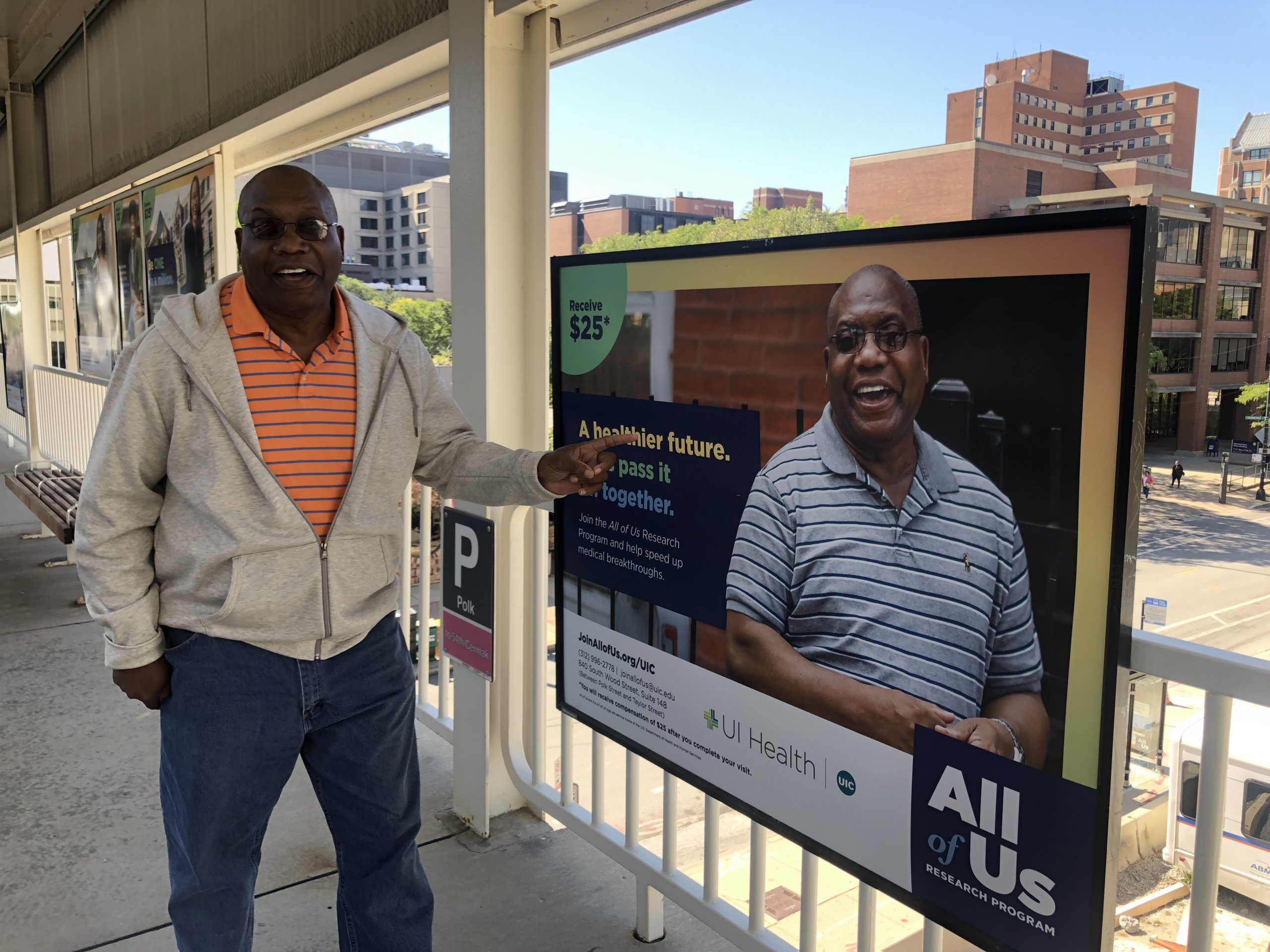
Cancer led Angela Walker to becoming a model.
Waller, a breast cancer survivor, is one of three University of Illinois Patient Brigade members who were photographed for a new All of Us advertising campaign that can been seen throughout select Chicago Transit Authority train platforms and rail cards on select cars. Walker was one of nearly 20 people photographed over a two-day period.
The All of Us Research Program was launched by the National Institutes of Health with the goal of tailoring medical care to the needs of each person. The study aims to gather data from 1 million Americans of all backgrounds in order to provide a hub for future research acknowledging the different factors that influence individual health.
The University of Illinois Hospital and Health Sciences System began participating in the program in 2017, and any adult 18 years or older and residing in the US is eligible to share their health information, such as lifestyle habits, medical history, family history, blood samples, and vitals, including blood pressure, height and weight.
The photo shoot, which also included Patient Brigade members Leniel Scott and Kimberly Richardson, was scheduled because some of the images available for the marketing materials from the national All of Us program “didn’t reflect our patient population at UI Health,” said Suzanne Hambright, assistant director of UIC’s All of Us Research Program.
“We wanted to capture images that had a Chicago look and feel so our outreach materials would be more reflective of our local communities – both the people and places,” Hambright said. “We want the people pictured to be relatable. They could be your neighbor, someone you sit next to on the bus, or pass on your way to work.”
A resident of Chicago’s McKinley Park neighborhood, Walker said she received a lot of great traits from her parents. Unfortunately, one thing she got from them she didn’t expect was cancer. On Feb. 13, 2006, at the young age of 34, Walker was diagnosed with the same disease that took her mother’s life at the age of 46 in 1999. That same year, her father died of cancer at the age of 48.
In December 2005, Walker discovered a lump in her left armpit. But having started a new job, she was on a 90-day probationary period, and she needed to wait 30 days until her medical benefits were activated in January 2006 before seeking care. Walker was diagnosed with triple negative invasive ductal breast cancer. She began three months of neoadjuvant chemotherapy with the goal of shrinking the tumor, then underwent a lumpectomy and eventually seven weeks of radiation.
Since her diagnosis more than 13 years ago, Walker has been involved with patient advocacy and research. Her experiences have led her to founding a nonprofit organization, “Elevated Survivorship.” The group’s mission is to provide a platform for black breast cancer survivors to use their voices to drive health system change globally.
In addition to her work with her foundation, Walker serves as manager of community relations and local government initiatives for Advocate Aurora Health. At the urging of her long-time friend and mentor, Karriem Watson, DHSc, MS, MPH, associate director of community outreach and engagement at the UI Cancer Center, Walker joined the Patient Brigade. Watson suggested using Patient Brigade members as models after Hambright approached him for recommendations for people to take part in the marketing campaign.
The All of Us program has currently enrolled more than 200,000 core participants who have completed all aspects of research, including consents, surveys, the sharing of electronic health data, and providing biospecimen samples for analysis, Hambright said. UIC has enrolled more than 10,000 participants since its inception in November 2017, she said. Within Illinois, more than 20,000 participants have been enrolled in the Chicago and Peoria areas in collaboration with partner institutions – Northwestern University, University of Chicago, NorthShore University HealthSystem and Rush University, as well as the University of Illinois College of Medicine at Peoria.
With the data, All of Us hopes to improve the medical and research community’s ability to design disease prevention and treatment strategies around individuals – their genes, environment and lifestyle.
“For too many years, medicine has been based around the ‘average patient,’ often to the detriment of vulnerable, minority communities whose circumstances and health risk are unique and far from average,” said Robert Winn, MD, director of the UI Cancer Center and co-principal investigator of UIC’s All of Us program. “A one-size-fits-all approach to medicine is less than efficient, but until now research alternatives have been limited.”
After seeing all of the photos from the two-day shoot, Hambright was delighted with the results.
“It’s a lot of work to organize a photo shoot this big,” she said. “We were really grateful to the Patient Brigade members for participating and look forward to collaborating with them in the future to inspire people to get involved in research.”
